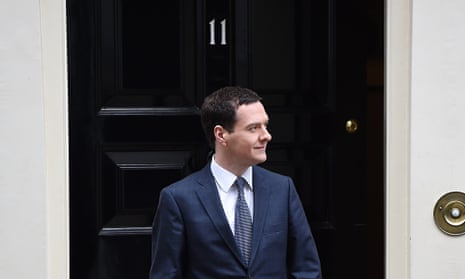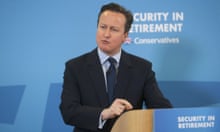A leading free market thinktank has issued a fierce attack on George Osborne, accusing him of cynical electioneering after the chancellor announced the amount of market-beating “pensioner bonds”, available to people over 65, would be increased to £15bn by the general election in May.
The Institute for Economic Affairs, which was closely associated with many of the policies introduced under Margaret Thatcher in the 1980s, criticised the extension of the scheme, arguing that it was distorting the market and was in effect a subsidy to wealthy pensioners.
“This announcement well and truly proves that we are not all in it together,” said Mark Littlewood, the IEA’s director general. “Borrowing more expensively than the government needs to is effectively a direct subsidy to wealthy pensioners from the working-age population.
“Pensioner bonds have never been anything other than a gimmick that will benefit pensioners at the expense of the taxpayer, and it beggars belief that the government is prolonging such a foolish policy. It’s high time our politicians stopped buying votes with subsidies for the old and rich.”
Responding to criticisms of the plans to expand the pensioner bonds programme, a source close to Osborne insisted the move had been nothing to do with the election.
“The scheme was part of a plan to support people who worked hard and saved. The extension was demand driven, nothing more,” the source said.
Demand for the government-backed National Savings and Investment bonds was so strong when they were first issued last month that the NS&I website crashed in response to the volume of inquiries.
There are two lengths of bond on issue: a one-year bond offering a return of 2.8% and a three-year bond at 4% — both comfortably beating the best rates on the commercial market. Pensioners are able to put up to £10,000 in each product.
Bonds worth more than £1bn were sold in the first two days, and the chancellor boasted on Sunday that the bonds had proved to be “the most successful savings product this country has ever seen. Over 600,000 pensioners have benefited from it”. He told BBC1’s Andrew Marr show: “I think it’s perfectly reasonable for a chancellor to say: ‘I want to support savers specifically’. And that’s why today we’re saying this 65-plus pensioner bond, which has been enormously popular and successful, is going to stay on sale for another three months.”
The number of pensioners putting their savings into the bonds is expected to reach 1 million. The Treasury said the bonds would be on offer until 15 May, with expected issuance rising from £10bn to £15bn. Meanwhile, Osborne admitted the cost to the taxpayer of extending the scheme would be in the region of “several hundreds of millions of pounds”.
The move has attracted immediate criticism as it underlines concerns that Osborne is preoccupied with offering sweeteners to key voting demographics ahead of the election.
Recent polls suggest the Conservatives will be heavily reliant on the pensioner vote. A survey from Populus put Labour comfortably ahead of the Tories among 18 to 44-year-olds, a gap that was reversed among the over-65s.
The latest sweetener for pensioners is likely to fuel accusations that Osborne has been regularly favouring this demographic. For further evidence, the IEA points to protection of the winter fuel allowance, free TV licences and bus passes as well as favourable calculations on the financing of social care for the elderly.
Labour said Osborne was trying to “erase the memory” of previous cuts.
The shadow Treasury minister Chris Leslie told the BBC’s Sunday Politics programme that pensioners had suffered under the coalition thanks to the rise in VAT and changes to age-related personal allowances. He said: “Don’t be surprised if George Osborne, as we get closer to an election, tries to give away all sorts of things when, actually, he is trying to erase the memory of how much he has taken away from pensioners. And he has not said where he is going to get the money for this. What other public services are going to suffer as a result?” he said.Pensioner bonds were announced in March last year in response to campaign groups highlighting the real-terms cut in the savings held by the elderly in their retirement thanks to low interest rates and high inflation. Since then inflation expectations have eased. Osborne said: “Our 65-plus pensioner bonds have been a huge success, and are already helping hundreds of thousands of older savers who have done the right thing, by boosting the return on their savings and securing a more comfortable financial future.
“I want to ensure as many older savers as possible can take advantage of these market-leading bonds, which is why I’m confirming today that potential savers will have months to invest in these hugely popular products, if they wish. [These bonds] are part of our long term economic plan to support savers and boost hardworking peoples’ financial security at all stages of life.”
One Conservative MP who is not known for rebelling wrote that he disagreed with Osborne’s extension of the bond scheme.
Dr Phillip Lee, the MP for Bracknell, wrote on his blog that the bonds act as a disincentive to younger people when the priority should be to incentivise them to work harder and be more productive.
“The problem is that, in order to afford to offer such preferential rates to a specific section of the community, the Exchequer has to borrow more money, a debt which will not be repaid by those benefitting from the bonds but by future generations. Although the cost of this policy (somewhere in the region of £350m) is relatively modest, it (along with other pensioner benefits) sends the wrong message to the younger electorate.”




Comments (…)
Sign in or create your Guardian account to join the discussion